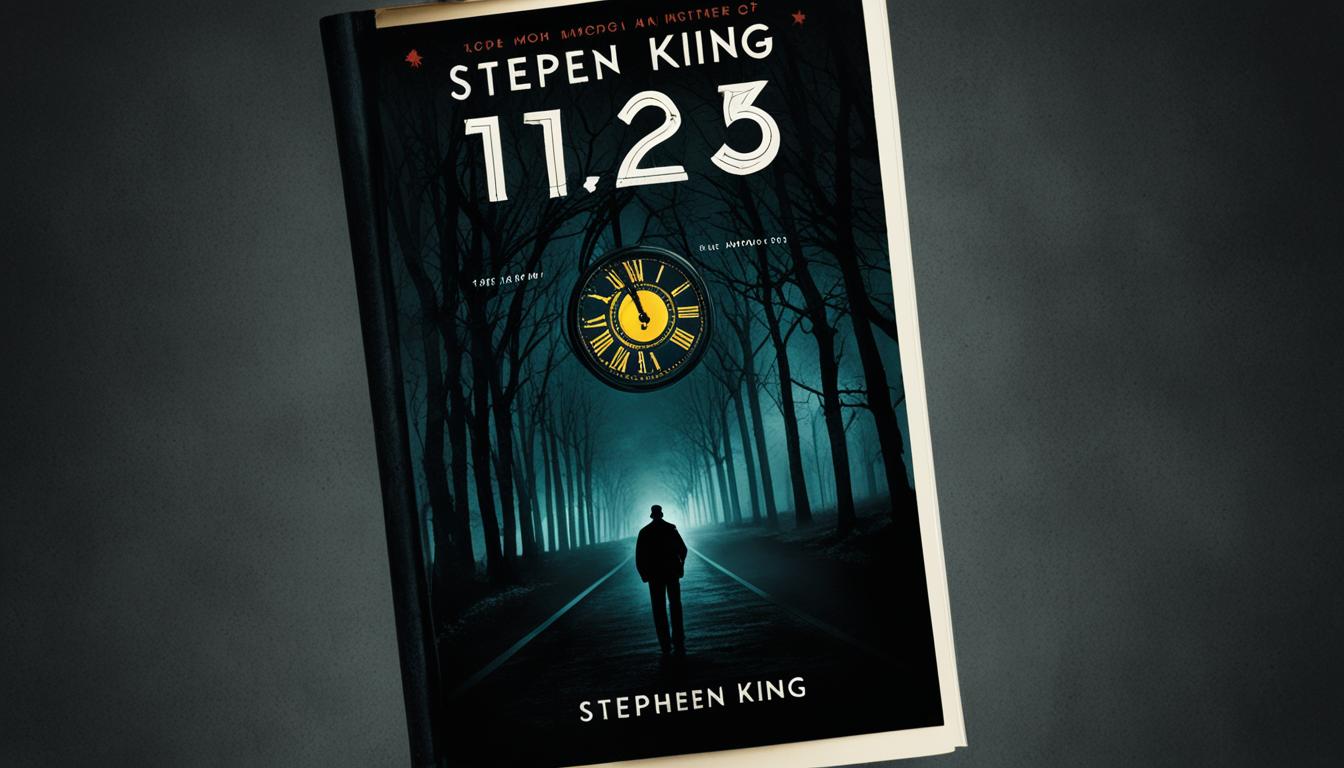Stephen King, the master of suspense and horror, has authored numerous best-selling novels, captivating readers with his engrossing storytelling and compelling characters. One of his most popular works is the time-travel tale “11/22/63,” which combines history, romance, and suspense to create an unforgettable reading experience. In this article, we’ll dive into the intricacies of King’s novel, exploring its unique characters, themes, and narrative style. Join us on a journey through time as we unravel the mysteries of “11/22/63.”
Stephen King: Master of Suspense and Horror
Stephen King is undoubtedly one of the most renowned suspense and horror writers of our time. With over 60 novels and 200 short stories to his name, King’s works have sold over 350 million copies worldwide.
King’s ability to create gripping narratives filled with terrifying scenarios and psychologically complex characters has earned him numerous accolades, including Bram Stoker Awards, World Fantasy Awards, and the prestigious National Medal of Arts.
King’s influence on the horror genre is undeniable, revolutionizing the way readers perceive the horror novel. Combining suspense, terror, and gore, King’s writing style has inspired countless imitators and admirers, cementing his place as a true master of his craft.
The King Table: Best-Selling Novels
| Rank | Title | Year | Copies Sold |
|---|---|---|---|
| 1 | The Shining | 1977 | 6 million |
| 2 | The Stand | 1978/1990 | 4.5 million |
| 3 | It | 1986 | 3.5 million |
| 4 | The Green Mile | 1996 | 2.6 million |
| 5 | The Outsider | 2018 | 1.5 million |
King’s works have not only captivated readers but have also been adapted into popular TV series and movies. Some of his most well-known adaptations include “The Shining,” “Carrie,” and “It.”
King’s literary prowess and contribution to the horror genre have solidified him as an icon in popular culture, leaving an indelible mark on the literary world.
Introduction to “11/22/63”
Stephen King’s novel, “11/22/63,” tells the story of Jake Epping, a high school English teacher who discovers a time-travel portal that takes him back to the 1960s. Epping is tasked with the mission of stopping the assassination of President John F. Kennedy on November 22nd, 1963. The novel is a unique blend of historical fiction, romance, and science fiction, making it a must-read for fans of Stephen King’s work.
The novel was first published on November 8th, 2011, and has since garnered critical and commercial success. It was named one of the best books of the year by numerous publications, including The New York Times and The Washington Post. “11/22/63” also won the 2011 Los Angeles Times Book Prize for Best Mystery/Thriller and was nominated for the 2012 International IMPAC Dublin Literary Award.
The Premise
The main premise of “11/22/63” is centered around time-travel and the events leading up to JFK’s assassination. Jake Epping, the protagonist, discovers a portal in a diner in Lisbon Falls, Maine that takes him back to September 9th, 1958. From there, he embarks on a journey to prevent the assassination of John F. Kennedy, which takes place on November 22nd, 1963, in Dallas, Texas.
The Plot
The plot of “11/22/63” is complex, as it is centered around the concept of time-travel and the consequences that come with tampering with historical events. Jake Epping must navigate the challenges of the past, including falling in love, disrupting personal lives, and facing the threat of Lee Harvey Oswald, the man allegedly responsible for JFK’s assassination.
The beautiful and vivid portrayal of the past comes to life, as Epping struggles to maintain a balance between his mission and his personal life. The novel is a thrilling read that will keep readers on the edge of their seats and is a testament to Stephen King’s storytelling ability.
Jake Epping: The Protagonist on a Journey
In “11/22/63,” Jake Epping is a high school English teacher who embarks on a perilous journey through time to prevent the assassination of President John F. Kennedy.
Throughout the novel, Jake’s journey is characterized not just by the physical challenges of navigating the past, but also by his emotional struggles as he grapples with the weight of his mission and the consequences of altering history.
The Man Behind the Mission
Jake Epping is a complex character with a richly nuanced backstory. Originally from Maine, Jake has experienced his own share of tragedies, including a failed marriage and the death of his father.
It is in the small town of Lisbon Falls that Jake’s journey begins when he is introduced to a portal in time – a “rabbit hole” that leads directly to 1958 – by his friend Al Templeton, himself a dying man on a mission to right a past wrong.
| Personality Traits | Notable Characteristics |
|---|---|
| Dedicated | Willing to risk everything to alter history |
| Emotionally vulnerable | Torn between his mission and a desire for a simpler life |
| Intelligent | Uses his knowledge of history and human behavior to his advantage |
The Perils of Time Travel
Jake’s mission to prevent JFK’s assassination is fraught with danger at every turn. Not only must he navigate the innumerable complexities of the past, but he must also deal with the unforeseen consequences of his actions.
As Jake journeys deeper into the past, he becomes increasingly aware of the impact his actions could have on the future. He also realizes that history itself seems to resist change, and he must take great care with every decision he makes.
A Hero’s Journey
Jake’s mission is one of heroism and sacrifice. He is a man on a mission, willing to risk everything to prevent one of the most tragic moments in American history from ever occurring.
Throughout his journey, Jake must face not only physical danger but also emotional turmoil as he struggles to balance the needs of the present with the exigencies of the past. In the end, it is Jake’s determination and resilience that allow him to persevere, even in the face of seemingly insurmountable odds.
The Time-Travel Mechanism: The Rabbit Hole
In “11/22/63,” time travel is made possible through a unique mechanism known as the “rabbit hole.” This portal allows the protagonist, Jake Epping, to travel back in time to the early 1960s and potentially change history by preventing the assassination of President John F. Kennedy.
The “rabbit hole” is depicted as a literal hole in the fabric of time and space, hidden in the pantry of a diner in Al’s hometown of Lisbon Falls, Maine. Upon entering the portal, Jake finds himself transported to September 1958, where he begins his mission to prevent JFK’s downfall.
| Pros | Cons |
|---|---|
| The concept of the “rabbit hole” adds a unique and exciting twist to the time-travel genre. | The mechanics of the “rabbit hole” are not fully explained, which could be frustrating for readers seeking a more scientific explanation. |
| The “rabbit hole” serves as a powerful metaphor for Jake’s descent into the past and the dangers of meddling with history. | The reliance on a single time-travel mechanism could be seen as a limitation on the imaginative possibilities of the narrative. |
| The use of the “rabbit hole” allows for a clear and simple method of time travel that enables the reader to focus on the story’s characters and plot. | Some readers may find the concept of the “rabbit hole” to be too fantastical or implausible. |
Overall, the “rabbit hole” is a clever and effective time-travel mechanism that sets “11/22/63” apart from other stories in the genre. Its significance in Jake’s mission, both as a literal portal and a metaphorical warning, adds depth and complexity to the narrative.
The Dynamic World of the Past
In “11/22/63,” Stephen King skillfully portrays the past as a dynamic and living world, complete with vivid details that bring the era to life. With a keen eye for historical accuracy, King paints a realistic picture of the early 1960s and the political and social climate that existed leading up to JFK’s assassination.
Through the lens of Jake Epping, readers are transported to the past and are confronted with a world drastically different from the present. The struggles and challenges faced by Jake as he navigates this unfamiliar landscape highlight the difficulties of existence in a past era.
The themes of race, class, gender, and politics are presented through a lens that is both thought-provoking and engaging. King’s attention to detail is particularly evident in his descriptions of locations, clothing, and daily life, which are meticulously researched and authentically rendered.
Historical Accuracy
King’s commitment to historical accuracy is evident in the degree of detail he provides regarding different aspects of life in the past. From clothing to politics to entertainment, he expertly captures the nuances of life in the 1960s. Readers are immersed in the past through comprehensive descriptions of everything from cars to radios, which creates a fully realized and immersive experience.
Challenges of the Past
The past is painted as a complicated and challenging place, as Jake must adjust to different norms and ways of life. He is forced to confront the darker aspects of the past, from racism to sexism to political corruption. Through these challenges, readers are given a glimpse into the difficulties of living in an era that is not their own.
In conclusion, King’s vivid portrayal of the dynamic world of the past in “11/22/63” is a testament to his skill as a writer and researcher. Through his attention to detail and commitment to historical accuracy, King immerses readers in a world that is both foreign and familiar, expertly capturing the challenges and nuances of life in the early 1960s.
Love and Romance in Unexpected Places
Stephen King’s 11/22/63 is not just a time-travel thriller, but a story rich with themes of love and romance. The novel follows Jake Epping, a high school English teacher who travels back in time to prevent the assassination of JFK. Along the way, he falls in love with Sadie Dunhill, a fellow teacher in the 1960s, and discovers unexpected relationships that challenge him in ways he never imagined.
Jake’s relationship with Sadie is at the forefront of the novel, and King masterfully captures the complexities of falling in love in a different time period. The couple’s courtship is both tender and intense, as they navigate the societal norms and prejudices of the 1960s while falling deeper in love with each other.
But love is not limited to Jake and Sadie. Throughout his journey, Jake encounters a cast of characters grappling with their own romantic struggles in unexpected places. From a reclusive librarian to a battered housewife, King weaves together a diverse range of love stories that add depth and meaning to the novel.
The Power of Love
Through these relationships, King shows how love can change people and shape their actions, even in the face of daunting challenges. Jake’s love for Sadie motivates him to risk everything to protect her, while the love shared by other characters underscores the novel’s message about the enduring power of human connection.

Ultimately, the themes of love and romance in 11/22/63 serve as a reminder of the importance of human connection, regardless of the circumstances or time period. By showcasing the unexpected places where love can be found, King invites readers to open their hearts and minds to the possibilities of the world around them.
The Dark Consequences of Altering History
Jake Epping’s journey through time to prevent JFK’s assassination has dire consequences. His actions alter history, and he must face the moral dilemmas of changing the past. Throughout the novel, Stephen King explores the consequences of altering history and the effects they have on the present and future.
The novel portrays the butterfly effect, where small changes in the past can have a significant impact on the present and future. Jake’s mission to save JFK has unforeseen consequences, leading to catastrophic events that challenge the fabric of time and reality.
Stephen King’s “11/22/63” delves into the question of whether changing the past is ever truly a good thing, raising philosophical and moral questions about the right to interfere with the course of history. Jake’s experiences offer a nuanced look at the consequences of altering events and the responsibility that comes with such power.
The Ethical Dilemma of Changing the Past
The novel presents an ethical dilemma that Jake grapples with: should he change the past and risk the unknown consequences or leave history untouched and face the fallout? The moral implications of time travel are explored in-depth, and the characterization of Jake’s decisions forces the reader to reflect on their own moral compass.
As Jake navigates his mission, he discovers that the past is unpredictable and that altering events can have far-reaching effects. The novel emphasizes the importance of considering the consequences of our actions, both on a personal and larger scale. “11/22/63” underscores the importance of understanding the gravity of our decisions and being mindful of the power we possess.
Stephen King’s Writing Style and Narrative
As a seasoned author, Stephen King’s writing style has become instantly recognizable to many readers. He is known for his descriptive and immersive narrative, often delving deeply into the thoughts and emotions of his characters. His writing is often graphic and unsettling, taking readers on journeys of horror and dark exploration.
In “11/22/63,” King’s writing style is on full display, drawing readers into the world of time travel and political intrigue. He combines his trademark horror elements with compelling romance and historical accuracy, weaving a rich tapestry of storytelling that keeps readers engaged from start to finish.
King’s narrative techniques further enhance the immersive experience. He carefully builds tension and suspense, using foreshadowing and vivid descriptions to create a sense of unease and anticipation. His use of dialogue is also noteworthy, seamlessly incorporating colloquialisms and regional language to add authenticity to his characters and their surroundings.
In short, Stephen King’s writing style and narrative techniques are integral to the success of “11/22/63” and his other works. His ability to create vivid imagery and compelling characters draws readers in, making them feel a part of the story.
The Table of Stephen King’s Writing Style and Narrative Techniques:
| Writing Style | Narrative Techniques |
|---|---|
| Descriptive | Foreshadowing |
| Graphic | Vivid Descriptions |
| Immersive | Dialogue |
| Compelling | Authenticity |
Critical and Popular Reception of “11/22/63”
Since its publication in 2011, Stephen King’s “11/22/63” has received widespread critical acclaim and been a favorite among readers. The novel has been described as a tour de force, marking a return to form for the author.
The book was a bestseller upon release and was nominated for numerous awards, including the Goodreads Choice Awards in the Best Fantasy category. It ultimately won the 2012 Los Angeles Times Book Prize in the Mystery/Thriller category.
Critics have praised the novel’s intricate plot, well-drawn characters, and vivid depictions of the era. The Washington Post called it “an impressive work of fiction” and “a mind-bending thrill ride.” Meanwhile, The New York Times Book Review hailed it as “one of Mr. King’s best books in years” and “an ambitious and accomplished work.”
Readers have likewise lauded the book for its gripping storytelling and emotional resonance. Many have praised King for his ability to seamlessly blend the genres of historical fiction, suspense, and romance into a cohesive narrative.

Critical Reception Scores
| Publication | Score |
|---|---|
| The New York Times Book Review | Positive |
| Publishers Weekly | Positive |
| The Guardian | Positive |
| Entertainment Weekly | Positive |
“11/22/63” has not only established itself as a standout in Stephen King’s diverse catalogue but also as a timeless classic in its own right. Its critical and popular reception have cemented it as a must-read for fans of the author and aficionados of time-travel fiction alike.
Impact and Legacy of “11/22/63”
“11/22/63” has left a lasting impact on readers and the literary world as a whole. Stephen King’s novel tackled the concept of time travel and its consequences in a unique and enthralling manner, cementing its place as a beloved classic in the author’s impressive body of work.
The legacy of “11/22/63” is evident not only in its fanbase but also in its adaptations. The novel was adapted into a television series in 2016, further extending its reach and impact.
The impact of “11/22/63” extends beyond the literary world as well. The novel sparked discussions on the consequences of altering historical events and the moral implications that come with such actions.
The Enduring Appeal
Despite being published nearly a decade ago, “11/22/63” continues to captivate readers with its blend of genres and compelling characters. Its impact and legacy are sure to endure for many years to come.
Conclusion
Stephen King’s 11/22/63 is an enthralling time-travel tale that blends history, romance, and suspense, showcasing King’s mastery of storytelling. Through the character of Jake Epping and his mission to prevent JFK’s assassination, King weaves a complex narrative that explores the consequences of altering the course of history and the unexpected relationships that can develop in unexpected places.
King’s writing style and use of descriptive language transport readers to the dynamic and vividly portrayed world of the past, making it come alive on the pages of his book. The critical and popular reception of 11/22/63 has been overwhelmingly positive, with many readers and critics praising the book’s engaging plot, well-developed characters, and careful attention to historical detail.
Overall, 11/22/63 has left a lasting impact on the literary world and remains a standout addition to Stephen King’s vast body of work. Its exploration of the complexities of time travel and the question of whether or not altering history is worth the cost will continue to captivate readers for years to come.



